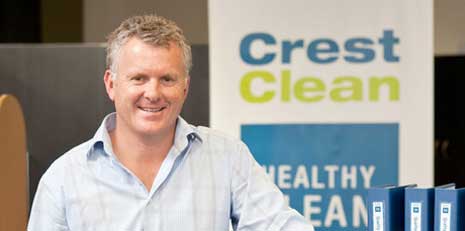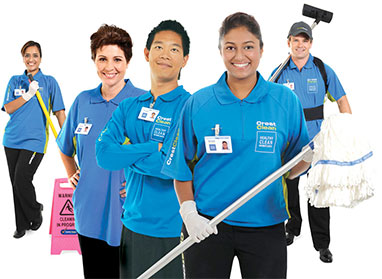Commercial cleaner sees growth potential in Indian and southeast Asian markets
 As reported in the nzherald.co.nz – May 7, 2012.
As reported in the nzherald.co.nz – May 7, 2012.
There are many ridiculous measures of economic cycles, but the Playboy index is surely the silliest.
American economists tracked booms and busts and matched the data with the bust-waist-hip ratio of Playboy models. They concluded that the vital statistics of a recession were 36-25-36 – a plus size in Playboy terms – while boomtime playmates were relative stick insects.
In New Zealand we must rely on more prosaic measures of growth and decline. But economists looking for a novelty indicator could do worse than consider what could be called the toilet brush index.
Grant McLauchlan is managing director of Crest Clean, a rapidly expanding commercial cleaning company that services medium to large-sized enterprises. He believes Crest is in a unique position to gauge the upswings and downturns in business activity.
To be fair, McLauchlan doesn’t use the term “toilet brush index”, but he does say CrestClean’s fortunes are a good match for regional unemployment numbers.
“We saw a big clean-out in South Auckland and it was hell there for our local guy and us, as a result.
I do believe the recession hit hardest in South Auckland and [pre-quake] Christchurch – and I don’t consider the other regions fared too badly,” he says. “Four years is a long time [but] we’re starting to see genuine economic growth.
“We see it in the regions from Tauranga, Rotorua, Christchurch, Invercargill, Kapiti Coast, Hamilton – [in South Auckland] out by the airport, a lot of those freight forwarders closed up but they’re now filling back up again and we’re seeing good growth.”
McLauchlan says another indicator is the length of contracts; Crest regularly signs two-year and “sometimes five-to-ten year contracts – there’s no question we’re seeing increased [growth].”
The past year has been particularly brisk: “Through the recession we’ve doubled the size of our business. We increased the [value] of contracts under management by 22.8 per cent between 1 April, 2011 and 31 March, 2012.”
McLauchlan expects operating revenue of $25 million to increase 30 per cent this year.
Crest Clean is an interesting firm because it’s a services company that exports to Asia. It has established a franchise in New Delhi, has spent considerable time looking at southeast Asian markets and is close to committing to Singapore and perhaps Vietnam.
They’re exporting a business model and cleaning system, based on British Institute of Cleaning Science standards, in an industry that McLauchlan says is “shocking – staff turnover is between 60 per cent and 100 per cent per annum.” At Crest, the average tenure is over five years “and that’s weighted down by the 60 people who joined us this year”.
“We turned what was a boring low-paid industry into a career path for these people,” he says. Investment in technology and education is the key. “Through to 2004 and about $4 million revenue, we were probably like the rest of the industry saying, ‘Here’s your gear, here’s your client, see you later’.”
Instead, the company changed into a hybrid cleaner-educator, offering skills and services to its employees and its clients. Regulatory compliance is cleverly exploited in the Crest Clean offering. “We invested a lot of money in our people, our IT systems and our brand.”
At its most basic, Crest takes 15 per cent of franchise revenue in return for its colour-coded cleaning system (“blue for loo, for instance”) and handles all the branding, advertising, tax and GST returns.
But there’s clearly a strong dynamic between franchise owners and head office that drives growth. The Indian venture came about because of the strength of old-fashioned business friendship.
A young, well-to-do Indian couple, Ajit and Shikha Jain, came to NZ and set up a Waikato franchise, then quickly upgraded to a South Auckland regional franchise. They became friends and the McLauchlans went to Delhi to meet the folks. Then came the call for the Jains to return home.
It was only natural that the Crest brand would be “Indianised”. Clients include Indian government agencies, schools and medical services. Revenue is NZ$1.5 million now, but McLauchlan describes the operation as “on the cusp”.
“The world is looking at India and if we get a brand going there then it’s going to make further international expansion easier.”
Singapore is imminent. “We want to make Singapore our hub for southeast Asia and NZ Trade & Enterprise have lined up a series of meetings with existing service providers. We see our business model as a good bolt-on for an existing company.”
Give Singapore six months, a year, then the same company can take Malaysia. “And then there’s the Middle East”.
